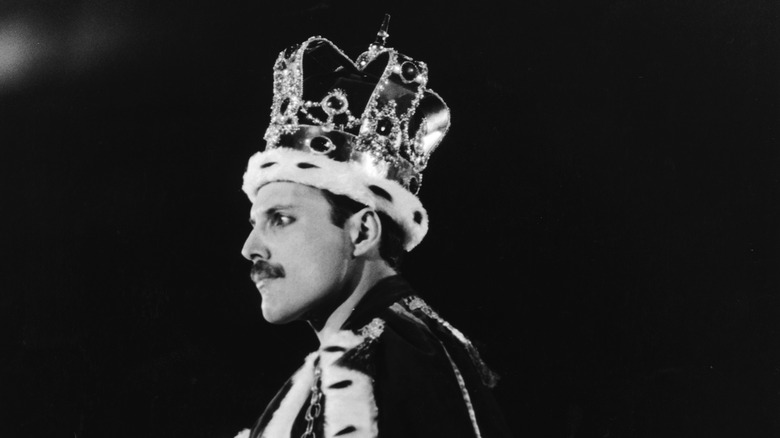Scientists Reveal What Made Freddie Mercury's Voice So Incredible
There's no shortage of talented musicians, and there are more than a few that certainly come to one's mind when thinking of industry icons. If the legendary rock group Queen crosses your mind when you think of raw talent and impressive vocal range, you aren't alone by any means. Queen has more than a few hit songs that everyone seems to know the words to, and crowds can be heard singing along to them as loudly as possible at every opportunity. Even though the impressive vocal range and variety of hard-to-hit notes seem impossible for the average human, for Freddie Mercury, they are achievable with both skill and style.
It's tempting to chalk up Queen frontman Freddie Mercury's ear-shattering four-octave vocal range to divine intervention; to consider him a sort of rock 'n' roll Chosen One and call it a day. But a team of European voice researchers attempted to dispel the mystery and magic in 2016 when they carried out an acoustic analysis of the singer's impressive pipes. What the study found — as well as what it didn't — reveals the rare ability that makes Freddie Mercury's voice so incredible to listeners of all ages.
The mystery of Freddie Mercury's vocal range
Through the testing of various theories and curiosities pertaining to Freddie Mercury's vocal range, researchers were specifically able to explain that iconic and inimitable growl that stands all the hairs up on the back of your neck when Freddie sings the words to, "Don't stop me now!" The technique doesn't come easy, and for a lot of folks, it doesn't come at all. The reason for this is because the range and growl that Mercury bellows melodically in each track require the use of what's known as "false vocal cords" — the two folds of the mucous membrane in the larynx also known as vestibular folds, which are to thank for that snarl in iconic lines like, "Gotta leave you all behind and face the truth."
Vestibular folds aren't commonly used when singing because even the most talented and highly trained musicians aren't always able to access this unique skill, but those who can activate them produce a rare vocal marvel called "subharmonic vibration." In layman's terms, it's that shiver running down your spine when Mercury's voice gets rough and raspy.
Freddie Mercury isn't the only musical icon with this unique skill
A 2013 linguistic study out of Canada's University of Victoria attributed the harsh voice qualities of quintessential blues singers such as Muddy Waters and the aptly named Howlin' Wolf — even of modern rappers like Lil Jon and Busta Rhymes — to subharmonic vocalization of the vestibular folds.
Metalheads will recognize this technique as the death growl that scares the faint of heart away from the grisly genre. According to Metal Injection, the death growl was born in 1966 on the album "A Quick One" by English rockers The Who. Bassist John Entwistle is credited with the sinister growl on the chorus of the hallucinatory "Boris the Spider."
All growls aside, the European vocal scientists were ultimately unable to explain that special something in Freddie Mercury's voice that keeps songs like "Bohemian Rhapsody," "We Will Rock You," "Killer Queen," and so many other hits rocking the radio waves: his spectacular vocal range. So the possibility remains that those four scientifically inexplicable octaves really were "A Kind of Magic" sent by the gods of rock to grace us with their presence for a short while before leaving our world as a legend, like a "rage that lasts a thousand years."
Even without this ability, Freddie Mercury's talents were endless
It isn't just the answers to a research study that explain the vocal powerhouse that is Freddie Mercury. According to Millers Music, Freddie himself even believed that the uniqueness of his teeth had something to do with his wide vocal range. However, he spent much of his time studying music outside of the rock genre and was known for his love and ability to perform opera — which, according to Music To Your Home, is one of the most challenging musical styles for a performer to master as it is taxing on the entire body. There's no doubt he was a man with not only talent but the drive to push himself to levels of musical heights that had never before been seen by anyone in the industry.
Of course, Mercury also left behind a life full of love, tragedy, and fun anecdotes (like the time he snuck Lady Diana into a gay bar), and the science behind the growl in his voice is just one of the many things we learned about Freddie Mercury after he died.



